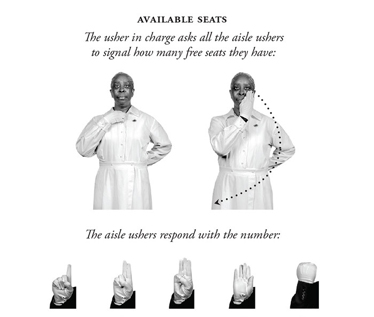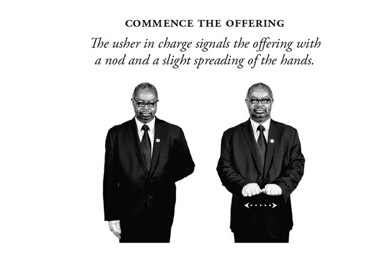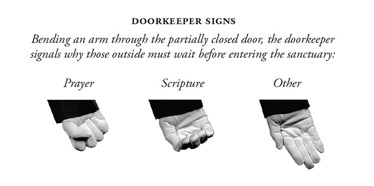
Oil Sick (James 5:13-20)
“How you doin?”
It’s the infamous stereotypical greeting between mob wiseguys. You might remember a series of Budweiser commercials some years ago that highlighted it.
In one, guys kept coming in to their favorite bar, and each time someone arrived, there’d be a new round of “How you doin?” between all of them.
They followed-up with a commercial in which an out-of-towner from Texas sat at the bar, and each time someone new arrived, and asked him, “How you doin?” he launched into a long dialog, not realizing it was a greeting and not a question.
“How you doin?” is remembered by some of you who were fans of the show, Friends. It was Joey’s magic pick-up line for dating girls.
I’ve dubbed James a “wiseguy,” in the sense that he calls upon us to seek and then apply God’s wisdom in every circumstance of our lives. You’d expect the ultimate spiritual wiseguy to ask, “How you doin?,” and James does not disappoint.
He doesn’t use that exact phrase; but as he closes his letter, he asks questions to probe how the dispersed Messianic Jews were doing.
I’ll organize my thoughts by asking the two questions James asked: #1 Is Any Among You Suffering?, and #2 Is Any Among You Sinning?
#1 – Is Any Among You Suffering? (v13-18)
A pastor went to visit Mrs. Jones, an elderly woman from his church who had just had an operation. As he was sitting there talking with her, he noticed a bowl of peanuts on the stand next to the bed. He began to eat them. When it was time for him to leave, he noticed he had eaten all of her peanuts.
“Mrs. Jones,” he said “I’m so sorry! I ate all of your peanuts.”
“That’s okay pastor,” she replied; “I already sucked all of the chocolate off of them.”
In my own visitations, I’ve had a few fails. The most epic was as a Chaplain for Lemoore PD, responding to a death, when I nearly introduced myself to the deceased in front of his family.
Visitation of the sick was one of the things James had on his heart as he closed his letter to the dispersed Messianic Jews.
Jas 5:13 Is anyone among you suffering? Let him pray. Is anyone cheerful? Let him sing psalms.
James mentions two ends of the spiritual spectrum – “suffering” and abounding – and thus includes everything in-between
James had a strong theology of suffering. By that, I mean he understood that Christians would, in this world, have tribulation.
The particular word he used for “suffering” means trouble of any kind – physical, financial, spiritual, etc.
At the other end of the spectrum are times when you are “cheerful.” He’s going for the idea that you’re in a time of spiritual blessing and abounding.
Now at both ends, and everywhere in-between, you should involve the Lord.
He is there with you in your suffering, so talk to Him in prayer.
He is there in your times of blessing, so sing to Him.
Suffering can cause us to doubt God and His goodness, which then hinders our prayers. Just keep praying… Just keep praying… Praying… Praying.
Times of blessing are super-dangerous. They are the breeding ground for spiritual complacency or, worse, spiritual pride. Rejoicing in the Lord acknowledges that your abundance is all from His hand; that every good and perfect gift is from above.
James next focuses on one particularly difficult type of suffering:
Jas 5:14 Is anyone among you sick? …
Physical illness, and death, entered into God’s creation when Adam and Eve sinned in the Garden of Eden. Jesus, in His role as the “second Adam,” has conquered death and illness; but since He has not yet returned to rule, and we are still in our fallen bodies, they are not yet eradicated.
If you believe everyone can be healed, then you must also believe that they need never die. Besides being ridiculous, that is not the plain teaching of the New Testament.
Many sincere servants of the Lord are described as falling ill, and dying, even in the company of apostles who had gifts of healing.
The apostles all died martyrs deaths, with the exception of John, who they tried to kill, but eventually exiled to Patmos. He later died a natural death – emphasis on he died.
Going forward in this verse, its important we realize that if any are sick among us, they may or may not be healed. It does not promise healing if certain conditions are met. James has already taught us that the overriding rule of prayer is, “if the Lord wills” (4:15).
Jas 5:14 Is anyone among you sick? Let him call for the elders of the church, and let them pray over him, anointing him with oil in the name of the Lord.
The New Testament mentions certain men as gifted servant-leaders of the church; they are pastor-teachers, elders, and deacons. The New Testament gives a lot of room as to exactly how those men are to govern in the church.
Rather than get stalled here, in an explanation of the three or so forms of biblical church government, I think we are on safe Scriptural ground by simply saying James wanted them to call upon the recognized leaders of the fellowship.
Something else to note before we go on. This appears to be a case of severe sickness. I’m not saying we shouldn’t pray for a common cold, but this situation was severe.
First is the fact that the elders are called to the sick man, indicating that he could not come to them.
Second, it is the elders who do all the praying. It hints at weakness in the one who was sick. In fact the word James chose for “sick” means weary and worn.
Third, the elders are said to pray “over him,” perhaps indicating he is confined to his bed.
The elders are called upon to do two things: To “pray over him, ” and “to anoint him with oil in the name of the Lord.” James is going to expand upon the particulars of the elders prayer in verse fifteen, so let’s first talk about the anointing with oil.
The Jews were all about anointing with oil. Mostly olive oil, it was used medicinally:
The Good Samaritan poured oil into the wounds of the man who had been robbed and beaten (Luke 10:34).
Isaiah 1:6 says, “From the sole of the foot even to the head, There is no soundness in it, But wounds and bruises and putrefying sores; They have not been closed or bound up, Or soothed with ointment.”
It was also the custom of the Jews to anoint themselves with oil, as a means of personal hygiene:
In Psalm 104:15 we read that God has given “oil to make [a man’s] face shine.”
When Ruth was to see Boaz, she was told, “Therefore wash yourself and anoint yourself, put on your best garment and go down to the threshing floor…” (3:3).
Oil was also used to anoint priests and kings as a symbolic representation of the Holy Spirit coming upon those men:
When Samuel anointed David to be Israel’s king, we read, “Then Samuel took the horn of oil and anointed him in the midst of his brothers; and the Spirit of the LORD came upon David from that day forward…” (First Samuel 16:13).
In Psalm 133, we get a description of the anointing of the high priest when we read, “It is like the precious oil upon the head, Running down on the beard, The beard of Aaron, Running down on the edge of his garments.”
When you broke-out with oil, a Jew would have all these in mind. It simultaneously represented the Holy Spirit, hygiene, and healing.
The fact that they were to anoint “in the name of the Lord” indicates this anointing of the sick was primarily symbolic.
I mean, when a Jew put oil on every day as part of his personal hygiene; or when he had it applied to a wound; it wasn’t “in the name of the Lord.” It was ordinary and mundane.
All of these meanings are important, but especially the idea that you were symbolizing God the Holy Spirit.
The sick man had undoubtedly already employed oil, or other means, of healing. That would be normal and natural. There’s nothing wrong with that, because it is God who gives us those means. God is not against medicine. There is no hint here that the elders be called before, or instead of, the physician.
But since all healing, even using medicine, is God’s prerogative, they brought Him into the situation by using oil to anoint as a visible representation of His healing, of restoring health. It gave the strong reminder that God can heal.
Should we use oil today – to anoint the sick? Here is what decides it for me: In verse fifteen, James says it is “the prayer of faith [that] saves the sick,” not the anointing with oil.
I’m not against it; I’ve done it over the years. I must admit, though, that the way we modern Christians anoint is not really biblical. We normally take a little dab of oil on a finger, and apply it lightly to the forehead. A little dab will do ‘ya doesn’t cut it.
These Bible guys had oil poured over their heads, running down their beards, staining their garments.
Try that and you’ll be the one needing healing!
Again, I’m not against it; I’m not saying it’s wrong. I’ll dab; I’ll pour.
Truthfully, using oil has little meaning to us, the way it did to the Jews, and so it becomes a little ritualistic. It could even become superstitious – as if the anointing with oil itself somehow effected the healing.
Positions and postures and potions are not required for God to heal; and they can smack of ritual that reduces God to a heavenly genie Who needs to be rubbed the right way.
Let’s get into the “prayer of faith.”
Jas 5:15 And the prayer of faith will save the sick, and the Lord will raise him up….
We already know, from the Bible, that not everyone will be healed. This is not a promise that if you have enough faith, God will heal you. And it’s the elders who pray, so we can’t blame the one who is sick in any case.
The wording is interesting. It isn’t a prayer that’s prayed by a person or persons having great faith. It is a particular prayer; it is “THE prayer of faith.”
The best thing I can do is give you an example. One day, Peter and John were going to the Temple, to pray. As they were going through the gate, they noticed a beggar – “a certain man lame from his mother’s womb…” who was laid daily there to ask for alms. Peter and John had passed that way before, many times. But on this particular pass, God the Holy Spirit directed their attention to the lame beggar, and we read,
Act 3:5 So he gave them his attention, expecting to receive something from them.
Act 3:6 Then Peter said, “Silver and gold I do not have, but what I do have I give you: In the name of Jesus Christ of Nazareth, rise up and walk.”
Act 3:7 And he took him by the right hand and lifted him up, and immediately his feet and ankle bones received strength.
Act 3:8 So he, leaping up, stood and walked and entered the temple with them – walking, leaping, and praising God.
THAT is an example of “THE prayer of faith.”
What James was suggesting is that the elders be sensitive to the Holy Spirit prompting them to pray THE prayer of faith – with the certainty the sick man will be healed.
One commentator put it this way: “We should always be alert in our prayers to the fact that God may wish to give us a particular gift of faith in relation to something which we ask Him.”
Most of our prayers, in the plan and providence of God, will not be THE prayer of faith. We might call those “prayers of rest,” because we are directed by God’s answer to rest in His will and in His wisdom.
Have you ever considered what an awful world this would be if every one of your prayers were answered? It’s better to rest in God.
And that helps me to understand something very curious about this whole passage. Why call the elders? You’d think, in the first century church, if anyone was sick, they should call an apostle who had gifts of healing.
Indeed, when Dorcas died, they sent for Peter, believing he would restore her to life… Which he did.
If not an apostle, why not call someone with the gifts of healing?
So, again, I ask, “Why call the elders?”
I can only speculate, but I think it’s because if THE prayer of faith isn’t granted by God, the sick person is going to need a great deal of spiritual support and counsel about sickness, and they need to get it from mature men of God who have a strong theology of suffering.
Severe sickness is no time for clichés, or thoughtless comments. Hopefully a mature leader can avoid those and bring real spiritual insight. Or, at least, cause no spiritual harm.
Jas 5:15 … And if he has committed sins, he will be forgiven.
We are quick to point out that not every sickness is the direct result of an individual’s sin. James agrees, saying “if,” indicating that it is not always, or even mostly, the case.
But the Bible does give instances where sickness is the result of personal sin, and where it functions as either a warning, or as a discipline.
In the church at Corinth, for example, many were sick, and some were dying, because they were sinning at the communion table. It was a warning to the church; and a discipline to them.
When you’re sick, it might be that it’s because of a particular sin, or habit of sin. Or you may simply get in touch with how generally sinful you remain, in this body of flesh.
Or you may have none of that going on, but the sickness reveals more of the sufficiency of the grace of God to you.
Jas 5:16 Confess your trespasses to one another, and pray for one another, that you may be healed…
Read this carefully. Not “sins,” but “trespasses,” meaning faults, are to be confessed.
They are to be confessed “to one another,” not to the elders, or to one elder, who has no connection with the faults. There is no justification here for the ritual of confession to a priest.
James was talking about a Matthew 18 situation, where a brother has ought against another brother; where someone has sinned against another believer.
They are to go to one another and work it out by agreeing it was sin, repenting, and being reconciled.
Whatever fault that was between them is removed, and they can now “pray for one another.”
The “healing” they receive is spiritual. It is a return to fellowship with God, and with each other.
Jas 5:16 … The effective, fervent prayer of a righteous man avails much.
Bad translation. A better one is, “The prayer of a righteous person is powerful and effective” (ISV).
James wants us to believe prayer is powerful and effective. It need not be “fervent,” as we will see in his example.
We might shy away from this, thinking, “I’m not a righteous man (or woman).” But by “righteous,” James means saved. You are right with God, justified by your faith in Jesus Christ, and thereby declared righteous.
Every Christian is a righteous man or woman.
Your prayer is “powerful and effective” whether it is THE prayer of faith; or a prayer of rest; or prayer between reconciled parties.
Jas 5:17 Elijah was a man with a nature like ours, and he prayed earnestly that it would not rain; and it did not rain on the land for three years and six months.
Jas 5:18 And he prayed again, and the heaven gave rain, and the earth produced its fruit.
Elijah took on the 450 prophets of Baal. He challenged them to call upon their god, to ignite a sacrifice by bringing fire from Heaven. They exhausted themselves trying, but failed.
Elijah called upon the God of Israel, and the fire came.
It wasn’t really about the fire. Elijah staked everything on the fact that our God hears our prayers and responds.
Elijah soon after was being hunted down by Jezebel. He grew depressed, to the point of wishing he could die.
He wasn’t suicidal, but he prayed to God to end his life. Even in his depression, Elijah prayed.
One fascinating fact: The man who prayed to die never died, but was taken to Heaven in a chariot of fire.
The particular episode James uses to show the effect and power of prayer is the drought that Israel endured as a result of Elijah’s praying.
Once again, the word “earnestly,” in “he prayed earnestly,” is a poor translation. It literally reads, “with prayer he prayed.” He just prayed, and God answered.
James is saying, “Just pray, and God will answer.”
You might be thinking, “That’s great – except, when I just pray, it’s never THE prayer of faith, and nothing miraculous like starting or ending a drought ever happens. Nobody ever gets healed; and nothing ever changes.”
Yes, it does; just not the way we might want it to. Prayers of resting in God’s sufficient grace are powerful; they are effective.
God can heal. He’s proven He can. Jesus healed almost everyone, and cast out demons to boot. He raised Lazarus from the dead.
He thereby showed us that He can do those things. They are, if I might be so bold, easy for Him.
If He chooses to not heal, or to answer your prayer in a way you dislike, it must be because He has something else in mind for you that will further you on your way to be becoming like Jesus.
I hesitate to say God has something “better” for you, because, at the time, you’d disagree. You can’t see, for example, how it’s better for someone you love to die from their sickness rather than be healed.
Perhaps a better word than “better” would be necessary. If God takes you through something, rather than answering your prayer, it must be necessary. There is, after all, a bigger picture which we will not see until we are with Jesus.
It’s as if Jesus is saying, “You see what I can do, so trust Me. If I don’t do what you are asking, what I am doing is necessary.”
#2 – Is Any Among You Sinning? (v19-20)
Every now and then there’s a sad story about someone being assaulted while bystanders do nothing.
There’s even a television show, What Would You Do?, where actors act out scenes of conflict or illegal activity in public settings while hidden cameras videotape, and the focus is on whether or not bystanders intervene.
We are generally appalled when bystanders do nothing.
James points out a situation in the church where we sometimes stand by, doing nothing – even though the consequences are dire.
Jas 5:19 Brethren, if anyone among you wanders from the truth, and someone turns him back,
Jas 5:20 let him know that he who turns a sinner from the error of his way will save a soul from death and cover a multitude of sins.
God’s Word is truth. But truth is something that we must live-out. We prove we know the truth by a life that matches it.
As the DoNut man sings, concerning the Bible, I read it, and I do it.
How sad when someone who was in fellowship gradually, or suddenly, wanders off, back into the world, back into sin.
They may still be in the fellowship; but their sin becomes known.
There is no call from them for prayer. They aren’t wanting to be rescued. They may even be antagonistic to any suggestion we intervene.
We cannot remain bystanders while a brother or sister is headed toward, or already in, sin.
We can “turn him [or her] back.” James gives no instruction as to how we turn them back – just that we must make any and every effort.
You “will save a soul from death and cover a multitude of sins.”
Is this person a backslidden believer? Or a person who professes faith but is not born-again at all?
We can’t always tell, can we? The only evidence we have that a person is saved is how they live. We are not privy to their hearts.
If they are mere professors of Christ, not in possession of Him, the phrase,”saves a soul from death and covers a multitude of sins” makes straightforward sense.
Their sins are “covered,” atoned for, at the Cross of Jesus Christ. Their eternal soul, once headed for Hades then Hell, now has a heavenly destination.
The “soul” of the backslidden Christian can also be described as being “saved from death,” in a spiritual sense. James has already told believers, earlier in this letter, that sin brings forth death.
Think of the things – the precious things – that die when you wander into sin. Marriages… Families… Friendships… Churches… Ministries.
You kill them in a very real spiritual and emotional sense.
When you go after a backslidden believer, and they respond, you are to “cover their… sins” as much as possible.
If their sin was personal, just something they were doing, there’s no need for others to know.
If their sin was against one, or more, that small circle needs to be asked to forgive.
If their sin was open and public, then all those who were affected need to be brought in to the process of restoration.
And with that, James was done. It’s an abrupt ending to the letter, don’t you think?
Some churches, as you exit, have a sign that reads, “You are now entering the mission field.”
This was James’ exit sign – verses nineteen and twenty. We could paraphrase it and say, “Now entering the world in order to turn back wanderers.”
Seen that way, it’s a perfect conclusion. A major theme in this letter was wisdom, and “he who wins souls is wise.”



